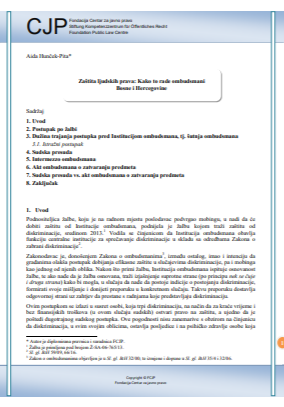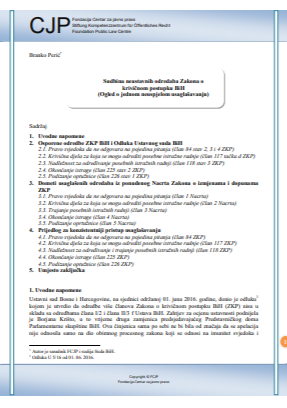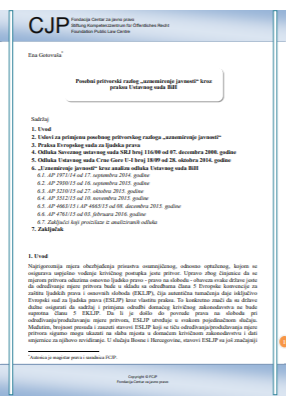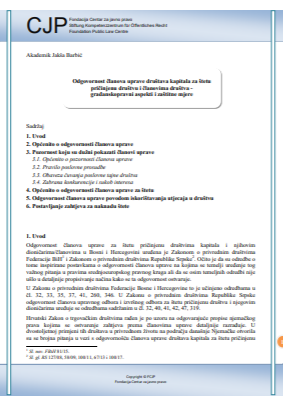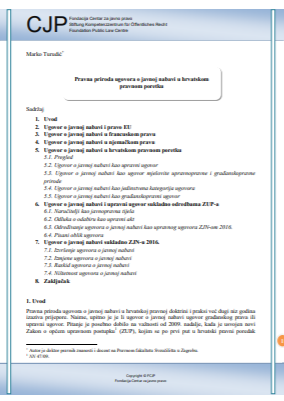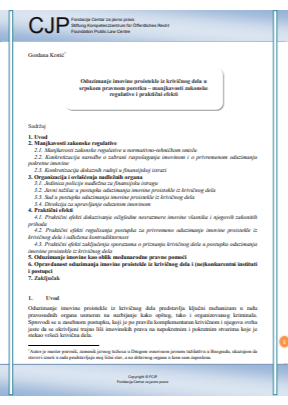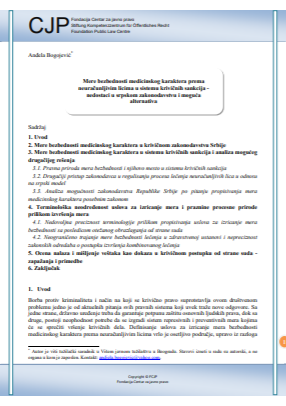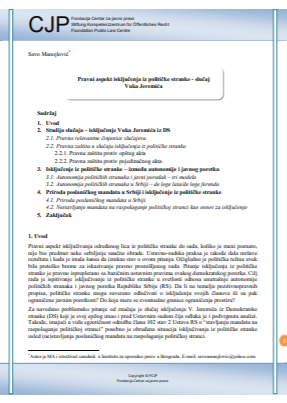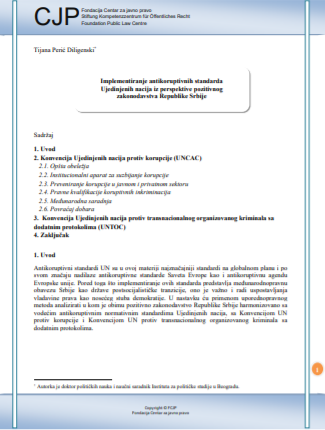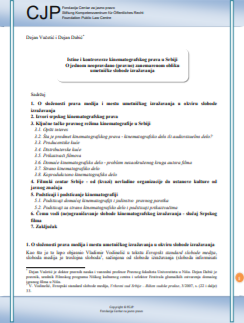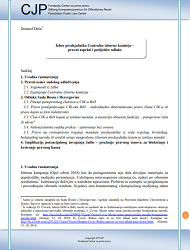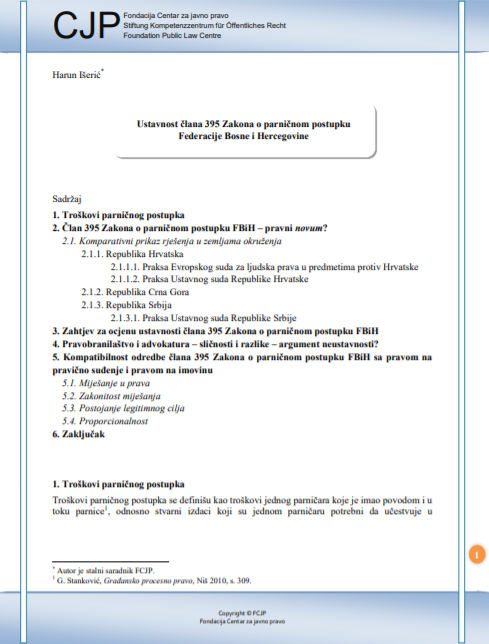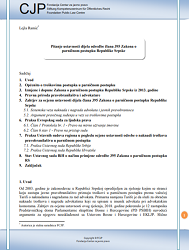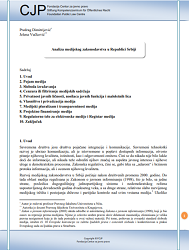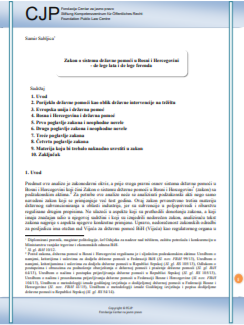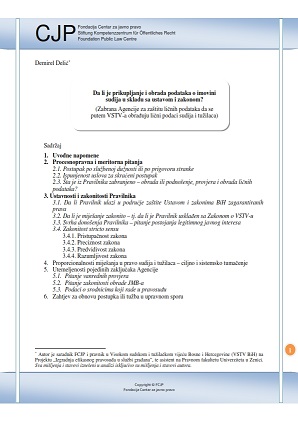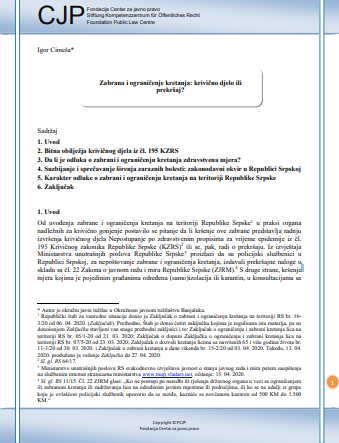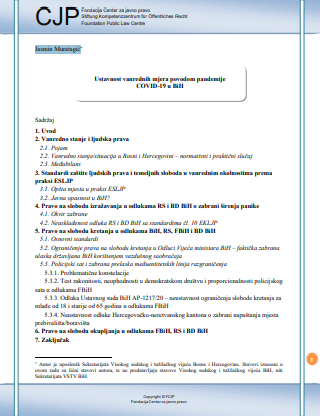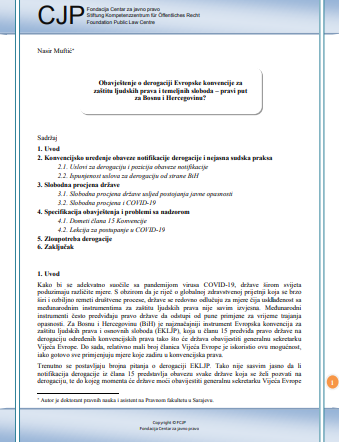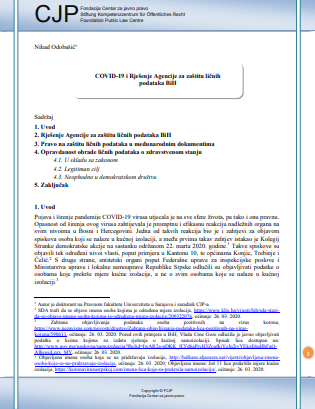Author(s): Demirel Delić / Language(s): Bosnian
The Agency for the Protection of Personal Data in Bosnia and Herzegovina, in an ex officio procedure, assesses the legality of processing personal data of judges and prosecutors in the manner prescribed by the Rulebook on Submission, Verification and Processing of Financial Statements of Judges and Prosecutors through the High Judicial and Prosecutorial Council of BiH, 05 in March 2019, issued a Decision (Decision of the Agency) that prohibited the HJPC BiH from processing the personal data of judges and prosecutors (paragraph I) in the manner prescribed by the Rulebook and paragraph II obliged the HJPC to notify the Agency within 15 days from the date of receipt of the decision on undertaken activities for the implementation of the said paragraph I. On the occasion of this Decision of the Agency, the HJPC of BiH, adopted the following conclusions: 1. The HJPC made a decision to postpone the application of the Rules for an indefinite period of time until the problem is resolved. 2. The HJPC has adopted the conclusion that it will organize a meeting with the Agency in order to overcome the problems. 3. Unless a favorable solution is found in negotiations with the Agency, the HJPC will, within the legal deadline, place an adequate remedy on the decision of the Agency. 4. After integrating with the Agency, the HJPC BiH Integrity Working Group will, in any case, proceed with the creation of a reserve option in terms of the Rulebook that will be applicable in 2019, and 5. Concerning the above conclusions, the Agency will be notified in order to execute the Agency's decision. In the explanation of the Agency's Decision, several points are noted that indicate serious failures in the procedure and in the application of legal solutions and standards on a particular case. In this case, the standard of fair treatment has been violated: the Agency received the complaint of the association of judges, which was clearly explained in detail, and then Agency stated that it acted ex officio, explaining that it was an indisputable fact because the Rulebook was published on the website of the HJPC. It is factually undisputed that it is not a procedure initiated ex officio and that the Agency fingers the action on its own initiative. Bearing in mind that all the arguments of the association of judges are related to the content of the Rulebook and that the Agency formally legally acted ex officio, it would be possible to present this procedure as an ex officio procedure. In order to understand the element of injustice, it is necessary to take into account the fact that the procedure was guided as an urgent (shortened) procedure. From the perspective of the legal layman, the question is whether the processing of financial statements is now controversial. If so, the explanation of the solution is completely contradictory. Namely, if only processing is controversial in the sense of the Rulebook, then the reasoning of the Decision goes beyond the boundaries of the pronouncement of the Decision, because the Agency enters into the argumentation of parts which were not even subject to the procedure ex officio. Asked whether the HJPC Rulebook is constitutional and legitimate, it is appropriate to implement the so-called tripartite test on allegations of violation of human right to private life (protection of personal data). The test consists of three steps. The answer to each of the questions asked must be positive (cumulative conditions) in order to establish that the Rulebook is constitutional and lawful. The Agency finds in the decision that the HJPC has adopted the Rulebook imposing obligations and interfering with the right to privacy of judges, prosecutors and their relatives, contrary to the provisions of the Law on HJPC BiH, the Law on Identification Number Act and the provisions of the Convention against Corruption. The provision of Article 86 of the Law on HJPC "Reporting of the HJPC on Activities" prescribes that judges and prosecutors submit to the Council an annual report stating, inter alia, the activities that they have performed outside the duties of the judge or prosecutor, including amounts that they have collected. [...] The Council sends forms for financial statements and may request additional information. In order to establish the limits of data (information) that the HJPC may require during the submission of annual reports, it is necessary to systematically interpret the relevant legal provision. The Agency applied a systemic interpretation of the norm. Nevertheless, the Agency has obviously overlooked (which was not allowed to do the following methodology of applying systemic interpretation) the general provision of the Law on the HJPC BiH prescribed (Article 3) that the HJPC has the task of ensuring independent, impartial and professional judiciary. In terms of the general provisions of the Act, as well as the provisions of Chapter VIII and in particular Article 86, the Agency concluded that the sole purpose of submitting, verifying and processing financial reports is to prevent conflicts of interest between judges and prosecutors, in the sense that the concept is understood by the Agency. This conclusion is wrong. Namely, the attitude that regulated data processing for the purpose of testing the origin of assets and determining the financial imbalance is not identical with the purpose of preventing conflict of interest is absurd and is in contrast to the purpose of the financial report. Accordingly, the incorrect conclusion is that the Law precludes the search for data that exceeds the annual financial activity. The law is really created by an abstract formulation, which does not concretize the details of the required elements from the financial report. But it does not demand anything that would be contrary to the ECHR in accordance with the standards of the required quality of the law. Namely, it is sufficient according to the standards of the ECHR that the law (here on the Law on HJPC BiH, but also the Rulebook) is accessible, predictable, assessable and understandable, then the criterion of the legality of the act is fulfilled. In the instruction on the legal remedy of the Agency's decision, it was indicated that an appeal is not allowed against the ruling, but an administrative dispute can be initiated before the Court of BiH within 60 days from the date of delivery of the decision. Therefore, the option is to initiate an administrative dispute in accordance with the Law in Administrative Disputes of Bosnia and Herzegovina.
More...
